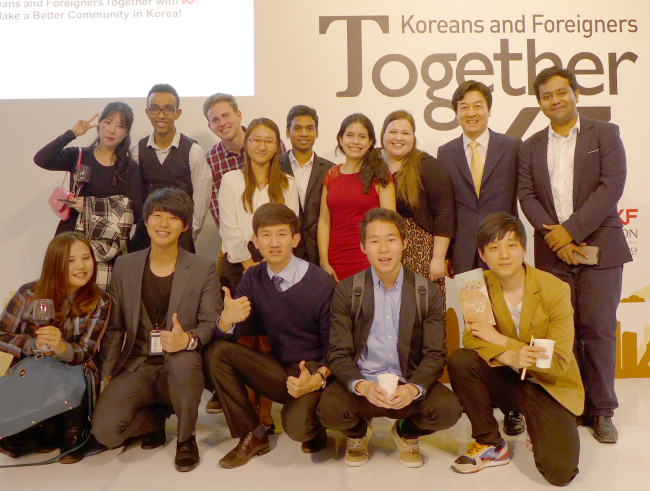The Korea Foundation has launched a program that connects foreigners and Koreans through language and culture.
Foreigners can take part in activities to experience Korean culture, while Koreans can participate in programs to deepen their global knowledge.
Foreigners and Koreans have an opportunity to interact through field trips and language studies, as well as at film, art and music venues offered year-round across Korea.
The Koreans and Foreigners Together Program was launched at the Korea Foundation Gallery in Seoul on Tuesday.
Mandy McManners from Dallas, Texas, who is studying at Konkuk University in Seoul, said she looked forward to making friends and improving her Korean language skills.
“This program is really welcoming to foreigners, because Koreans are generally shy about approaching foreigners due to insecurities about English,” McManners told The Korea Herald.
 |
International students pose at the opening reception of the Koreans and Foreigners Together Program at the Korea Foundation Gallery in Seoul on Tuesday. (Joel Lee/The Korea Herald) |
“I had many Korean friends back home, and ate Korean food all the time. I was so into Korean pop culture that I decided to come here to experience it firsthand.”
McManners’ interest in Korean culture developed seven years ago through Korean variety shows and soap operas. Since then, she has listened to K-pop, underground hip-hop and ballads by artists such as Park Hyo-shin and Sung Si-kyung.
Korean musicians have started performing in Dallas and become popular among local teens and high school students, she said. “K-pop is the window into the language, fashion and food of Korea.”
Another aspect she likes about Korea is people’s polite etiquette and the vertical order of society.
“I really appreciate Korean people’s courtesy toward others, particularly elders,” she said. “In America, it’s really not that way. A lot of young kids think they’re entitled to whatever they want.”
Hanging out in big groups in Korea is also thrilling for youngsters, McManners said, while pointing out that American youths socialize in small coteries. “Friends in Korea are like an extension of family. We bond together very much.”
McManners, who wants to have a career in broadcasting in Korea, said she is ready for the notorious after-work drinking culture, where workers drink alcohol together to strengthen camaraderie.
Triston Webb, 32, from London, came to Korea last September on a yearlong scholarship by the Korea Foundation. He is enrolled in an intensive Korean language program at Sogang University in Seoul.
Webb, who worked for six years in the Ministry of Justice in London as a civil servant, quit his job to “take a leap into the unknown in Korea.”
Webb’s passion for Korea piqued when he was teaching English in Ulsan in southeastern Korea in 2000 when he was 18.
“After I got to know Korean people closely, I was left with deep questions about how South Korea developed the way it had, while North Korea took a completely opposite path,” Webb said.
To answer these questions, Webb undertook a master’s program in Korean studies in the U.K. and came back to Korea with his wife and son to learn more. His long-term ambition is to be able to read Korean newspapers and academic journals with ease.
As both Webb and his wife have a deep interest in Korea, they want to take advantage of the educational opportunities here, and have Korea firmly involved in their careers, Webb added.
By Joel Lee (
joel@heraldcorp.com)








